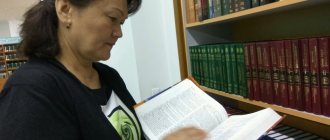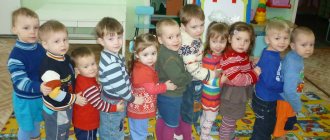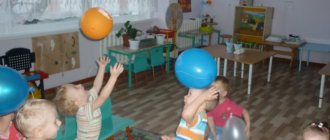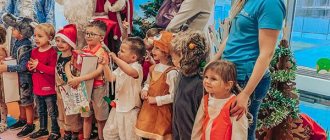To improve the quality of work of teaching staff and introduce the latest theoretical professional developments into practice, seminars are used for kindergarten teachers on various topics. They help to learn how to apply acquired knowledge in practice, therefore they are extremely useful for the work of educators themselves and indirectly for the training and education of children in preschool institutions.
Since the goal of any seminar is to apply theoretical knowledge in practical conditions, this type of training can use various topics depending on the purpose of the workshop. They are designed for a specific focus, for example, there are seminars for teachers of the younger group or thematic sessions related to a specific task, for example, with the development of speech in children of the second junior group, with the preparation of graduates for school, with the specifics of using fine arts in education, etc. Further.
Assignment of seminars and workshops
The seminar is an interactive form of training with a high level of efficiency. With its help, you can successfully solve numerous complex problems, as well as study the issue discussed at the seminar in depth and from all sides.
Any workshop workshop in kindergarten for teachers sets specific tasks and goals. It cannot have an abstract purpose, since it involves the implementation of specific knowledge and skills into practical use in preschool educational institutions.
The main objectives of the workshops are the following:
- Development of creative imagination and thinking.
- Improving knowledge and skills.
- Conducting discussions and debates.
- Creation and discussion of problem situations for their collective solution.
- Formation of competent recommendations.
In order for such a seminar not to be a mere mark of an event, its topic must be relevant specifically for a particular institution. For example, in a kindergarten where children with hearing disabilities are raised, an important topic for such a meeting may be the use of visual aids to develop in children associative connections between the name and the surrounding subject environment.
Also, the topic of the seminar should not be formal, that is, it involves solving specific issues. For example, if we are talking about implementing the requirements of the Federal State Educational Standard and the professional standard of preschool teachers, issues that are primarily interesting and not entirely clear to those gathered should be considered. The goal of the seminar should be to obtain practical knowledge on the topic used, which will allow them to be introduced into their daily practice in the work of the group and the entire kindergarten as a whole.
Preparation for the seminar:
- Questioning of teachers “Formation of early career guidance for preschool children. Introducing children to the work activities of adults"
- Analysis of PPRS on the organization of career guidance work with preschoolers
- Methodological recommendations for teachers Seminar/workshop progress:
- Theoretical part
Amazing country of childhood! You can dream about your future, for example, who to be. To realize your dream in games: today - a doctor, tomorrow - a banker and even a president... Professional self-determination is interconnected with
personality development at all age stages, therefore preschool age is considered as a preparatory age, in which the foundations for professional self-determination in the future are laid.
In order to instill in children a respectful attitude towards work, it is important to enrich their understanding of different types of professions of adults, the role of work in people’s lives, the results of work, and the motives that motivate people in the process of work.
Preschool children are able to understand the essence of adults’ activities, the motives and goals of their work, and ways to achieve results.
In modern pedagogical science, the problem of familiarizing preschoolers with the work of adults has been studied by many scientists: such as N.E. Veraksa and T.S.
Komarov, they recommend introducing children to the types of labor that are most common in a particular area.
Today, the main directions of child development have been identified, including the educational area “Social and communicative
development”, in which one of the subsections highlights the section
"Self-service, independence, labor education."
Early career guidance is predominantly informational in nature (general acquaintance with the world of professions), and also does not exclude a joint discussion of the child’s dreams and experience acquired in some types of work activity.
Children's thirst for knowledge is enormous. As it develops, it is transferred to various actions, people’s work, and their professions.
We, teachers, prepare children so that in due time they can boldly enter into independent life. Therefore, knowledge about labor should occupy one of the leading places in the educational work of a kindergarten.
The socialization of a preschooler is carried out largely through play as the closest, most accessible, and most interesting activity for children.
Solving problems to familiarize adults with labor is based on a game. It is necessary to introduce children to professions that are in demand in modern society, in our city.
After conducting a survey to determine the place of career guidance work in a preschool educational organization, it was revealed that:
- (100% of children show interest in this topic),
- Activities to familiarize adults with labor are planned during all regime moments, in joint and free activities.
- Are various forms, methods and techniques used when organizing work on early career guidance for preschoolers? receptions - (conversation, excursion, game, educational activities, reading fiction, thematic meetings, exhibitions, parent meetings, observations, entertainment and holidays, quizzes)
Techniques - (visual, verbal, practical)
- conditions have been created in groups (games, equipment, screens, dolls in specialized clothes, attributes for s/r games, card files, albums, i.e. equipment for PPRS).
- work with parents of students on this issue (conversations, consultations, parent meetings, master classes, visual information, open classes, surveys, involving parents in joint creativity, holidays and entertainment).
- Do the students in your group know where their parents work and what work processes they perform? (23% - yes, 77% - bad, not all)
- What do the children of your group want to work in the future? (doctor, policeman, teacher, driver, salesman, builder, cook, fireman, veterinarian, teacher, hairdresser - simple professions, there are no new professions, professions relevant for our village)
- What do you see as problems in implementing the tasks of this area in preschool educational institutions:
∙
- I don’t have enough knowledge on this issue - 2 people.
- I think this problem is not relevant
- Other – 6 (must be carried out in the system)
- Determine the level of implementation of career guidance work in your group (self-assessment):
Where and how can seminars and workshops take place?
Seminars can be used as an effective means of training the teaching staff of a preschool institution and as a way to develop the creative abilities of employees. They can be held at a variety of levels - starting from the preschool educational institution itself and ending with large meetings at the district, regional or national level.
Typically, seminars held in kindergartens deal with more specific current topics or are related to the implementation of theory into practice, in particular, new legal requirements. If we are talking about seminars organized by specialized enterprises, then they may concern broader issues, for example, the socialization of students from different social strata of society or the psychological relief of preschool employees.
In some cases, you can take seminars for kindergarten teachers for free. On the Internet you can find sites with useful publications in this area, which can be used by teachers and kindergarten teachers as a basis for self-education and self-development.
Competition “Finish the proverb”
Competition conditions: each team chooses one card and gets two minutes to complete the task.
The team’s task: read the beginning of the proverb and formulate (think of) its ending.
“What a master - .....” (such is the work)
“It’s hard to live for someone... (who runs away from work)
“With words here and there... (but with deeds - nowhere)
“Labor feeds... (and laziness spoils)
“Who loves to work... (he can't sit idle)
“The bird is red in plumage,.. (and man is in handicraft)
Who needs seminars and workshops?
Since pedagogical science is constantly developing, new systems, methods and areas of work are being used, which practicing teachers and educators have to study and apply in their activities. This is necessary so that progress in the field of pedagogy does not remain only theoretical achievements, but has a direct impact on the practical process of education and training in preschool institutions.
That is why it is necessary for all kindergarten employees to take part in such seminars, regardless of their position and work experience. Even if a person has been working as a teacher for several decades, this does not mean that he does not need to improve himself and develop professionally. Often, for this category of preschool educational institution employees, such workshops are vitally important, since they underwent professional training a long time ago, at a time when the requirements for teaching and education were strikingly different from modern ones. Seminars will help them introduce best practices into their daily activities, making them modern, better and more advanced.
The seminar for beginning kindergarten teachers is equally important. Having just graduated from a secondary or higher pedagogical educational institution, they have a wealth of knowledge in their profession. But these are just theoretical calculations that they have yet to apply to real, real work with children. Therefore, seminars and workshops are a vital necessity for them. At them, novice educators and teachers learn to apply their knowledge for practical purposes, learn the intricacies of their profession, and become real employees of children's educational institutions.
The workshop will help you systematize the knowledge gained and transform it into special actions aimed at achieving your goal. This is an effective way of training and self-improvement for preschool teachers and educators.
Tasks:
- enrich and concretize children’s ideas about the professional activities of residents of the city of Kulebaki, cultivate interest in the industrial enterprises of our city;
- to form in children generalized ideas about the structure of the labor process, the role of modern technology in human labor activity, an understanding of the relationship between the components of labor activity;
- strengthen children’s skills to express their impressions in playful and productive activities;
- stimulate the development of cognitive, communicative, creative abilities of children;
- cultivate a caring attitude towards the work of adults and its results;
- help children realize the importance, necessity and indispensability of each profession.
Work on early career guidance for preschoolers is based on the following principles:
- The principle of personality-oriented interaction (organization of the educational process based on deep respect for the child’s personality, taking into account the characteristics of his individual development, and treating him as a conscious, full-fledged participant in the educational process).
- The principle of accessibility, reliability and scientific knowledge.
- The principle of openness (the child has the right to participate or not to participate in any activity, to provide or not to provide the results of his work, to provide as a result what he, and not the teacher, considers his achievement, to decide on the continuation or completion of the work).
- The principle of dialogicity (the ability to enter into a conversation about the performance of work, the result obtained, prospects for continuing work, social situations that contributed or prevented the desired result from being achieved).
- The principle of actively including children in practical activities (excursion, observations, work assignments, conversations, entertainment, quizzes, games)
6.. The principle of reflexivity. It is fundamental for each child to understand himself as a subject of his own activities and social relations. As a result, the child develops an idea of himself, his capabilities, and his success. Thus, the ability to understand actions, self-assessment of results, and self-regulation of behavior is formed.
7. The principle of the regional component. Aimed at bringing educational and educational practices into line with the social order and financial capabilities of the region.
Work on early career guidance for preschool children can be carried out through the joint activities of the teacher with the children and independent
activities of children that pass through cognitive, productive and playful activities
Joint activities between children and adults include cooperation
children not only with teachers, but also with parents. In the process of cooperation with adults, children develop communicative and cognitive skills.
research skills, an understanding of the norms and rules of social behavior and representatives of various professions is formed.
Children can receive information about professions during the pedagogical process in kindergarten and beyond (excursions, conversations, observations, readings, discussions, looking at pictures, conducting
theatrical puppet shows, didactic, moving,
musical and dance games, classes to master certain skills,
It is very important that the child not only observes the work of adults, sees its features and results, but also participates in joint labor
activities with an adult, fulfilling work assignments and requests). Then in the future he will be able to use the obtained information in
independent activity (role-playing game), consolidate and expand acquired knowledge.
Independent activity of children in the process of becoming familiar with the professions of adults has the following forms of organization:
- games (role-playing, didactic, theatrical);
- productive types of children's activities (designing albums, making attributes for games, drawing, appliqué, designing, making collages and posters);
- performing labor actions (at the request or instructions of an adult);
- experimentation.
Thus, the formation of preschoolers’ ideas about the world of work and professions is a relevant process in the modern world, which must be built taking into account modern educational technologies.
- Technology of project activities (L.S. Kiseleva, T.A. Danilina, T.S. Lagoda, M.B. Zuikova).
Project activity is an activity with a specific purpose, according to a specific plan, to solve search, research, and practical problems in any area of educational content.
- Technology of research activities (A.I. Savenkov, N.A. Korotkova).
Research activity is a special type of intellectual and creative activity, generated as a result of the functioning of the mechanisms of search activity and built on the basis of research behavior. For research activities, the following types of research can be selected that are accessible and interesting to children of senior preschool age:
- experiments (experimentation) – mastering cause-and-effect relationships and relationships;
- collecting (classification work) - mastering genus-species relationships when performing feasible work).
- Pedagogical technology for organizing role-playing games (D.B. Elkonin, A.V. Zaporozhets, R.I. Zhukovskaya, D.V. Mendzheritskaya, A.P. Usova, N.Ya. Mikhailenko).
A game is the freest, most natural form of immersion in real (or imaginary) reality for the purpose of studying it, demonstrating one’s own labor education.”
“I”, creativity, activity, independence, self-realization.
- The technology of integrated learning (L.A. Wenger, E.E. Kravtsova, O.A. Skorolupova) is a kind of innovative technology for preschool institutions. Integration is a state (or a process leading to such a state) of connectedness, interpenetration and interaction of individual educational areas of the content of preschool education, ensuring integrity.
Familiarizing children with the work of adults is one of the important tasks of preschool education. Success in this direction will be achieved only if a systemic activity approach is used.
This approach helps to stimulate children’s interest in the world of professions, systematize ideas and successfully socialize each child.
- Subject-based development environment for the purpose of early career guidance To organize work to familiarize children with the work of adults in
groups need to create a subject-development environment. For this purpose, special centers are being established to familiarize adults with labor with game modules, role-playing games, didactic games, and visual material. In such centers, a child can train himself in the ability to observe, remember, compare, act, achieve
the set goal in their independence and initiative.
Each center is a special developmental subject-spatial environment, taking into account the specifics of each age group of children and creates conditions for a game plot. I will introduce to your
Attention somewhat involves introducing children to the variety of professions in our area, helping to imagine what the professions of the future might be like. Didactic games allow you to understand their features and expand your understanding of them.
- - presented by building constructors and play materials. Each group must be represented
certain professions in accordance with the OOP - from a house builder to an architect. In play areas, children build with sand
- The Rescue Service center is represented by the corners of a young firefighter.
- An important component of such a center is the labor activity of children in the vegetable gardens and flower beds of preschool educational institutions, which are located next to the site. Game activities are built taking into account the traditions of people living in our region.
- represented by game centers in a group, layouts, “Lapbook” folders, and various types of construction kits.
- allows children to discover themselves as leaders,
journalists, photographers, book authors, etc. The result of data activity is the filming of stories, the publication of newspapers, and the creation of interactive folders.
- creates conditions for acquaintance with the banking profession, the ability to count, plan, and save.
- . The main goal of the center is to develop an environmental culture in children, to form a conscious and
responsible attitude towards the environment. At the center, children get acquainted with the topic of waste recycling, problems of sorting and
reducing the amount of household waste.
The created conditions will make it possible to carry out interesting
excursions (to the laundry, to the library, to school, to the post office), quest games, travel games, etc. During the excursion, children get the opportunity to observe various ways of performing professional actions
a person of one profession or another.
In the second part of the seminar, teachers were invited to participate in
"Game library", during which it is necessary to generalize and expand
ideas about forms and methods that activate the cognitive interest of a preschool child. Teachers were asked to divide into teams.
Both teams were given tasks. At the end of the game library, the results were summed up.
Competitions on a single topic
(using the example of the profession “Journalist”)
- The presenter reads a riddle about the profession of journalist: The entire sheet is covered in quick handwriting -
Writes an essay for the newspaper... (Journalist.)
- Presenter: A journalist must have good diction, I suggest you take part in the “Pure Talk” competition.
Conditions of the competition: each team chooses one card on which a tongue twister is written and receives two minutes to complete the task.
The team's task: to speak a clear phrase in chorus.
- I met a hedgehog in a thicket:
“Like the weather, hedgehog, fresh.” And we went home trembling,
Hunched and cowering, two hedgehogs.
- Senya carries hay in the canopy, Senya will sleep in the hay.
- A teapot with a lid, a lid with a cone, a cone with a hole,
Steam comes into the hole.
- Well done, he ate thirty-three pies with pie, and all thirty-three pies with cottage cheese.
— Our chebotar
To all chebotars, chebotar,
No one can outdo our shabby stuff.
- At the stumps again
Five again found five guys.
- Host: When communicating with different people, a journalist must have a rich vocabulary. I invite you to take part in the competition “Items
wardrobe starting with the letter “P”
The team's task: to name as many wardrobe items as possible to a given sound. Conditions of the competition: each team names one subject, one after another, without repeating, without prior preparation.
- Host: A journalist can write a note in a newspaper or magazine on any topic. I invite each team to take part in the competition:
“Write a note about your profession”
The team’s task: to talk about “your” profession according to the following scheme: name of the profession – place of work – working conditions – tools for
work - labor operations performed - the result of labor (in other words, compose a story in a certain sequence).
Conditions of the competition: Teams are given 4 minutes to complete the task, then the stories they receive are listened to.
- Host: A journalist should know the works of other writers well. I invite teams to take part in a literary competition “
Guess the fairytale profession."
Conditions of the competition: each team chooses one card on which the name of a famous children's fairy tale is written and receives two minutes to complete the task.
Team task: name the professions of specific literary heroes
of the work indicated on the card.
Based on the results of practical work, both teams scored the same number of points.



